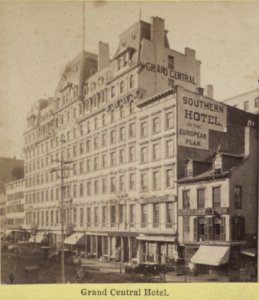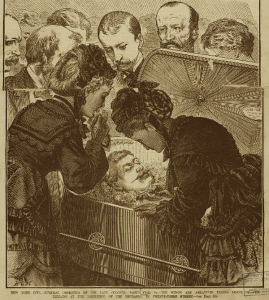 If ever a New Yorker could be described as an unscrupulous, gaudy vulgarian, it would be “Jubilee” James Fisk.
If ever a New Yorker could be described as an unscrupulous, gaudy vulgarian, it would be “Jubilee” James Fisk.
“He was a striking figure, tall, florid, very fat,” wrote Lloyd Morris in Incredible New York. “His light brown hair was pomaded and carefully waved, his mustache waxed to fine points, and huge diamonds blazed on his frilled shirt front and pudgy fingers.”
Fisk was a financier, unprincipled and notorious even in a Gilded Age city that celebrated greed and showiness.
In 1868 he and his business partner, Jay Gould, were responsible for the Black Friday stock market crash, the result of their plan to manipulate the price of gold.
They made millions off the scheme, though, just as they profited handsomely after they joined forces with Boss Tweed to gain control over and loot the Erie Railroad.
“He never pretended to be governed by anything but expediency and self-interest,” wrote Morris. “And he conducted his life in full view of the public.”
 That may have been Fisk’s fatal mistake. Because when another business partner decided to kill him, he knew exactly where to find him.
That may have been Fisk’s fatal mistake. Because when another business partner decided to kill him, he knew exactly where to find him.
That would be Edward Stokes, who entered the picture in 1869. The flashy son from a well-off New York family, Stokes convinced Fisk to invest in a deal to reopen an oil refinery in Brooklyn.
Stokes got money from Fisk—and he also ended up with Fisk’s mistress, Josie Mansfield (below), a would-be actress who had “an exquisite figure and perfect features, large black-lashed eyes, magnificent glossy black hair,” wrote Morris.
Mansfield and Stokes were now the talk of the town; everyone, including Fisk, eventually knew about their affair.
 Meanwhile, by 1871, Fisk’s and Stokes’ refinery deal went sour. Unless he paid him an additional $200,000, Stokes threatened to release a series of love letters between Fisk and Mansfield that presumably reveal Fisk’s shady business practices.
Meanwhile, by 1871, Fisk’s and Stokes’ refinery deal went sour. Unless he paid him an additional $200,000, Stokes threatened to release a series of love letters between Fisk and Mansfield that presumably reveal Fisk’s shady business practices.
After some legal maneuverings, Fisk had Stokes and Mansfield indicted for extortion.
When Stokes found out about the extortion charges on January 6, 1872, he packed his pistol, went to the Grand Central Hotel—a new hotel on Broadway and West Third Street popular with Fisk’s posh and powerful crowd—and waited for Fisk, who was due to meet friends there.
“He knew that Fisk always entered by the ladies entrance, so Stokes went in first and waited on the second floor landing,” states Murder by Gaslight.
 “When he heard Fisk climbing the stairs Stokes started down saying: ‘now I’ve got you.’”
“When he heard Fisk climbing the stairs Stokes started down saying: ‘now I’ve got you.’”
Stokes fire point blank. Fisk cried out in pain, and Stokes shot again. Fisk collapsed on the staircase leading to the lobby but gave a dying declaration that Stokes was his killer.
His life ended the next morning at age 36. Stokes served four years in prison.
Fisk was the consummate Gilded Age robber baron, yet he had his admirers, many of whom paid their respects in the foyer of the Grand Opera House on Eighth Avenue and 23rd Street, where Fisk had his offices and his body lay in state.
 Brooklyn preacher Henry Ward Beecher had disparaged Fisk as “the glaring meteor, abominable in his lusts and flagrant in his violation of public decency.”
Brooklyn preacher Henry Ward Beecher had disparaged Fisk as “the glaring meteor, abominable in his lusts and flagrant in his violation of public decency.”
But younger New Yorkers who came of age as the Gilded Age began seemed to admire his “smartness and shrewdness,” explained Morris.
“In refusing to be bound by the traditional moral code, in declining to become the prisoner of convention and decorum, in rejecting the easy compromise of hypocrisy, Jim Fisk had shown an intrepidity that compelled their admiration,” he wrote.
Power, greed, lust, corruption—the Gilded Age was one of notorious crimes and murder trials, as The Gilded Age in New York, 1870-1910, available now for pre-order, lays out.
[Top photo: Wikipedia; second photo, MCNY, 1910; third photo: NYPL; fourth photo: via Minneapolis Star Tribune; fifth and sixth images: covers of Frank Leslie’s Illustrated Newspaper, January 1872, NYPL]
Tags: Black Friday 1868, Boss Tweed Gilded Age, Broadway Central Hotel, Gilded Age Robber Barons, James Fisk Robber Baron, Jim Fisk Jay Gould, Josie Mansfield, Murder of Jim Fisk, Top Hotels NYC Gilded Age

August 15, 2016 at 6:50 am |
Scary! Sound familiar???
Yikes!
August 15, 2016 at 11:15 am |
The Grand Central met a fate worse than Fisk’s on 8/3/1973, how well I remember that horrid day: https://en.m.wikipedia.org/wiki/Grand_Central_Hotel
http://mobile.nytimes.com/2015/11/08/nyregion/broadway-central-hotels-heyday-before-a-fatal-collapse.html
August 28, 2016 at 1:24 am |
That’s actually the Broadway Central Hotel, as it shows in the first photo. When it opened it was the height of elegance, and featured in Theodore Dreiser’s novel “Sister Carrie.”
In 1965, having long since fallen on hard times, it hosted one of the earliest Comic-Cons held in NYC. Later, it literally collapsed. It’s now the site of an NYU dormitory.
August 28, 2016 at 10:49 pm |
A highly-fictionalized version of this story was filmed as “The Toast of New York” (1937), with Edward Arnold as Fisk, the legendary Frances Farmer as Mansfield, and a young Cary Grant in a supporting role. Not a great movie, but worth seeing. http://www.imdb.com/title/tt0029675/?ref_=nm_flmg_act_71